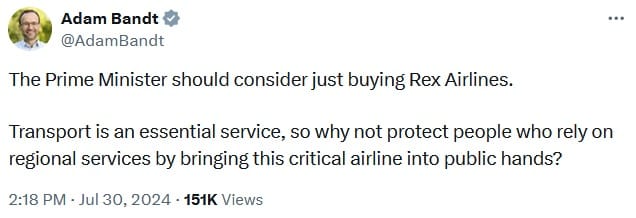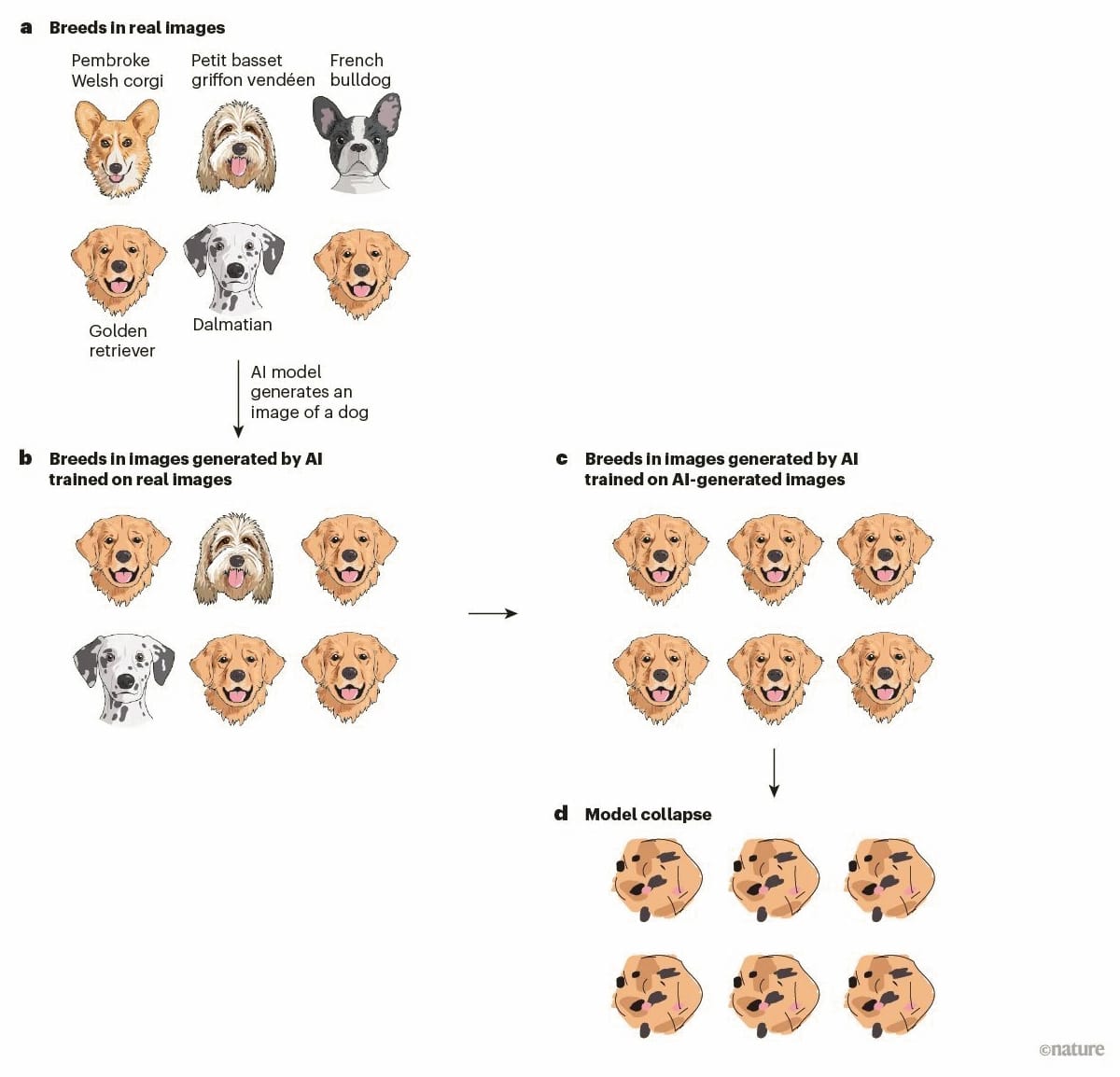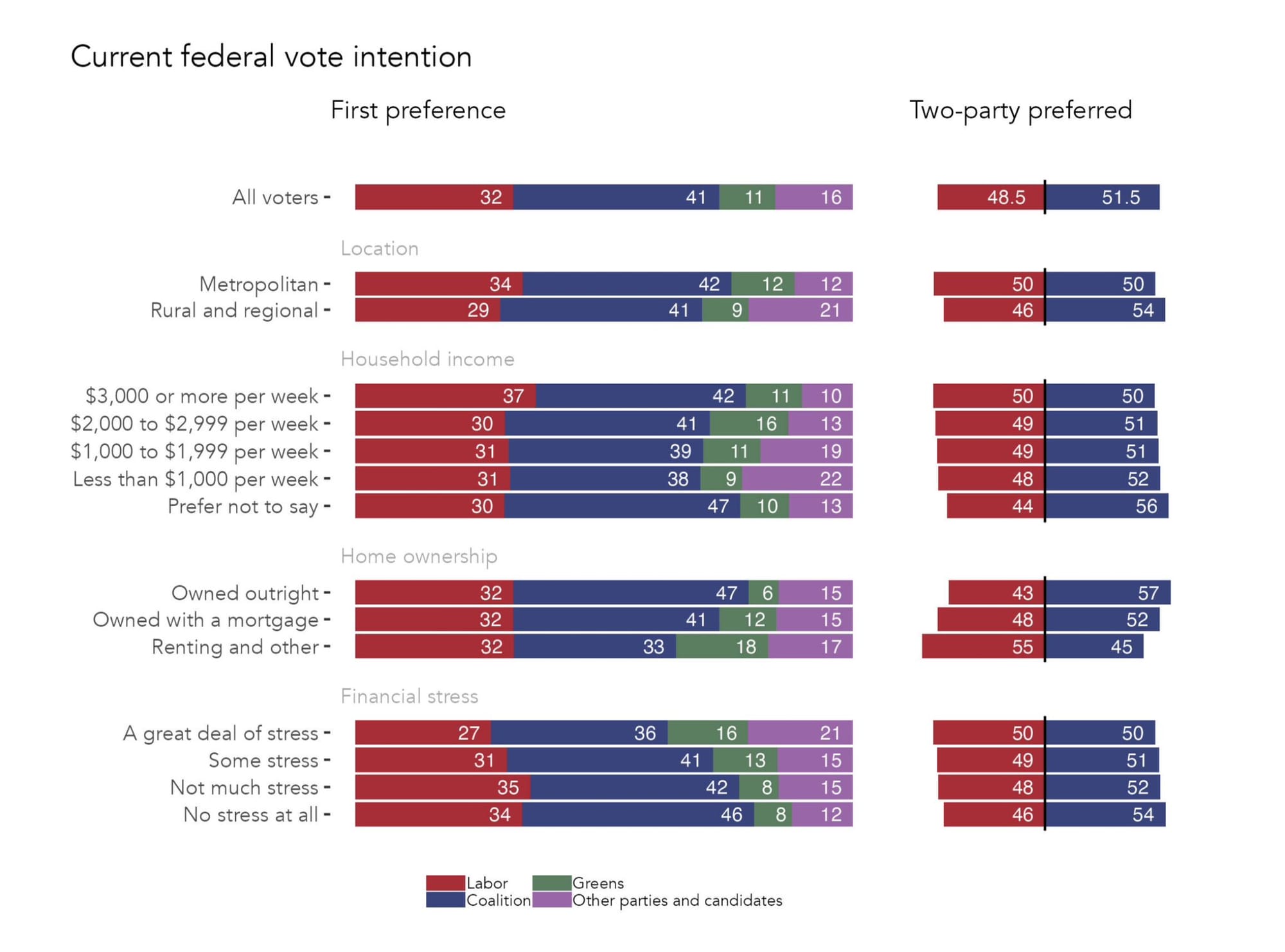Friday Fodder (29/24)
Rex Airlines' owners should take a haircut; the limits to synthetic AI data; California versus AI; how a cybersecurity firm took out the world's computers; and Paris is showing that it's time to dial back the Olympics.

Lots to get into today, starting with the big news that Australia's third airline might be kaput just over a month after the fourth, Bonza, went bust.
Let Rex fail
Rex Airlines, Australia's third carrier and only provider of many regional services, entered voluntary administration this week. Like clockwork, there were calls for the government (i.e., taxpayer) to bail it out:
"Treasurer Jim Chalmers said the government has had "discussions" over whether taxpayer support would be used to assist the airline.
"Look, obviously there's been discussions. But I don't want to pre-empt the company statement," he told ABC News on Wednesday morning.
He indicated the priority was to ensure "regional services continue" and assist employees who might lose their jobs due to the announcement."
Or, if you're the Greens, nationalise it:

One can't help but wonder what Bandt wouldn't consider to be an essential service that should be nationalised. It's also odd that the Greens, of all parties, would want the government to own a business in one of the most polluting industries in Australia. But they also object to the cleanest, safest energy source available so... who knows what they're on about.
That aside, there's not even a good argument for government support, let alone nationalisation. You see, Rex was profitable for many years. In 2018 its Executive Chairman, Lim Kim Hai, boasted that:
"Rex joins the rarefied club of probably not more than five listed carriers worldwide that have not made a statutory loss (excluding write-downs) in the last 15 years. In fact, since the GFC of 2010, the Rex Group has still managed to generate an average Gross Return on revenue (PBT/Revenue) of 6.2% compared to 0.8% returns for the Qantas Group, while the Virgin Group is hopelessly entrenched in negative territory having close to $1.5 billion of accumulated statutory losses before tax."
Rex was a good business that generated above-average returns for its shareholders, thanks in no small part to federal, state and local government subsidies on its regional routes that allowed it to fly aircraft well below capacity. It was only when it acquired a bunch of Boeing 737s and expanded into the "Golden Triangle" (Sydney, Melbourne, Brisbane) that its fortunes turned. Management gambled, lost, and its shareholders should be punished by losing a bunch of their equity.
After all, capitalism is about profit and loss, right?
The good news is that the valuable parts of Rex can be revived. If permitted, new owners will acquire Rex's profitable assets, airport slots, and existing government subsidies, and business as usual will resume – minus the loss-making 737 capital city routes and current management.
Where there is an opportunity for the government is that this is the perfect excuse to reform how our airline industry works. Qantas and Virgin control hugely valuable landing slots at major airports, most notably in Sydney, that they can keep by meeting a bunch of criteria at an effective price well below what they would fetch at an open auction. Any potential competitor is then forced, as Rex was, to compete using slots people don't like as much – e.g. midweek, midday flights – which has never worked out all that well in Australia.
So, slot reform is definitely something that should be looked at. Not just for large commercial routes, but also the protection of regional slots at major airports, which are hugely inefficient "and contributes to the wider capacity problem at Sydney Kingsford-Smith Airport through its distortive effects on the efficient allocation of capacity".
In 2019 the Productivity Commission, while acknowledging the inefficiency, argued that the regional "ring fence" at Sydney should be preserved because otherwise there would be "negative outcomes for regional communities". That's more of a normative declaration – how many inefficient regional subsidies are too many? – but it still suggested plenty of possible improvements to the existing regime, which it described as "unnecessarily restrictive".
My advice is to let Rex fail and be reborn under new ownership, and for the government get on with the long-overdue job of reforming the aviation sector. Everyone knows what needs to be done, so just... do it!
AI will run out of data
A newly published paper in Nature found that it's not possible to train AI on AI-generated data and expect them to continue improving. After a while, the model collapses and ends up producing crap:
"We discover that indiscriminately learning from data produced by other models causes 'model collapse'—a degenerative process whereby, over time, models forget the true underlying data distribution, even in the absence of a shift in the distribution over time."
In image form:

It turns out that human interaction is essential for large language models to continue improving:
"[I]n learning tasks in which the tails of the underlying distribution matter, one needs access to real human-produced data. In other words, the use of LLMs at scale to publish content on the Internet will pollute the collection of data to train their successors: data about human interactions with LLMs will be increasingly valuable."
A separate paper resolved the issue of model collapse by utilising feedback on synthetic data provided by "both humans and machines", because "it is easier for both humans and machines to tell between good and bad examples than to generate high-quality sample".
So, there may be hope for synthetic data yet. But progress certainly won't be as quick as those expecting exponential growth to continue with the same exponent. The low-hanging fruit has indeed been picked.
California against AI
If a technological wall and market trepidation – investors are beginning to realise that AI companies may not be all that great at making money – don't slow the AI hype train, then California's politicians might:
"The bill bans any website from hosting AI systems that don’t include a watermarking feature. Depending on how you read the bill’s somewhat confusing definitions, that could force HuggingFace to take down most of the generative models on its site.
The bill also requires every generative AI system to maintain a database with digital fingerprints for “any piece of potentially deceptive content” it produces. This would be a significant burden for the creator of any AI system. And it seems flatly impossible for the creators of open weight models to comply.
Under AB 3211, a chatbot would have to notify the user that it is a chatbot at the start of every conversation. The user would have to acknowledge this before the conversation could begin. In other words, AB 3211 could create the AI version of those annoying cookie notifications you get every time you visit a European website."
It always amazes me how the technological centre of the world, Silicon Valley, can exist within a state whose government appears to actively despise it.
Here's more from Zvi Mowshowitz, who actually read the "stunningly terrible bill" that passed the California Assembly unanimously and offered up the following take-aways, which I'm repeating verbatim:
- Essentially all LLMs and most other generative AI systems are banned.
- New generative AI systems must place maximally effective watermarks on all content, in ways that may or may not be possible to comply with.
- Open models might or might not have it even worse than that, and don't know. We do know that hosts could not let anyone download any LLM that exists today.
- New digital cameras have to include watermarks.
- Any interaction with an AI system whose content could be mistaken for a human must include disclosure it is an AI system. That means permanent on screen statement for text or video, and audio statement for voice.
- Many things with 1 million California users, including search engines, social media platforms and messaging services, have to visibly mark every piece of text or video as human or AI generated. Every audio must say which one it is at the start and finish. Every user input must include an active user indication of whether it is AI or human (and the system must run detection software on it to check).
- Violations can cost you $1 million or 5% of your global revenue. Which for Meta would be ~$7 billion, or ~$15 billion for Google.
Yikes. The bill still has to clear the Senate, and could be vetoed by the Governor. But it certainly gives you some idea of the lack of critical thinking among California's state politicians.
Unintended consequences, #89,523
How was a botched update from a cybersecurity firm able to take down millions of the world's computers, cancelling flights, closing stores, and generally grinding economic activity to a halt for a day or two? Clearly CrowdStrike needed better protocols in place to prevent a catastrophic patch going out to everyone all at once, rather than gradually. I mean, that's just basic server administration.
But the reason it was able to do so much damage is because of a deal struck in 2009 between Microsoft and European antitrust regulators that prohibited the maker of Windows from properly securing its operating system:
"CrowdStrike's bug was so devastating because its security software, called Falcon, runs at the most central level of Windows, the kernel, so when an update to Falcon caused it to crash, it also took out the brains of the operating system. That is when the blue screen of death appeared.
In 2020, Apple told developers that its MacOS operating system would no longer grant them kernel-level access.
That change was a pain for Apple's partners, but it also meant that a blue screen-style problem couldn't happen on Macs, said Patrick Wardle, the chief executive of Mac security maker DoubleYou.
'What it meant was that a lot of third-party developers, ourselves included, had to rewrite our security software,' he said.
A Microsoft spokesman said it cannot legally wall off its operating system in the same way Apple does because of an understanding it reached with the European Commission following a complaint. In 2009, Microsoft agreed it would give makers of security software the same level of access to Windows that Microsoft gets."
Good intentions only get you so far.
Time to dial back the Olympics
Paris has copped a lot of flak this Olympics: an underwhelming and potentially offensive opening ceremony; a river too polluted for athletes to swim in; a pool so shallow that the extra wake is slowing swimmers; uncomfortable cardboard beds; and low-protein vegan meals that have forced some countries to bring their own chefs or abandon the athlete's village entirely.
So, even if it was fiscally costless, it may not have been a good idea for Paris to piss off locals and non-Olympic tourists by hosting the Games, given all the negative press.
But it's not fiscally costless:
"Paris is the first reuse/retrofit Olympics, and while costs do indeed seem lower, the same kinds of cost overruns seem to be occurring."
Ruh roh. So how bad is it? Pretty bad: costs have surged from an original EUR 3.6 billion to 8.8 billion, or by 144%. Economist Tim Taylor wraps this story up with a recommendation for how he'd stop such blow-outs happening at a future Games:
"I'm probably a bigger sports fan than your typical person, but I'd start cost control by by dropping the sports where professionals already have major global exposure in the non-Olympic events: soccer, golf, basketball, tennis. These sport also require large venues. Except for the awfulness of it all, I have no interest in the three-on-three Olympic basketball, or in watching Americans wipe out the world in flag football as scheduled for the Los Angeles Games in 2028.
I'd also dial back on the glitz. I've heard television commentary to the effect that the organisers for the Los Angeles Olympics in 2028 are already asking: 'How can we outdo the spectacle of the Paris Games?' I suspect the common answer is not: 'Just focus on the athletes, and bring the Games in under budget.'
Opening ceremony? Just cut a damn ribbon! For the Australian taxpayer's sake, I only hope Brisbane's officials are paying attention (but let's be real, we all know they're not, or at least not where it counts).
Fun fact
Not since John Howard in 2004 has an Australian Prime Minister served a full term and been re-elected. Anthony Albanese seeks to break that run, assuming he (1) actually sees out a full term, and (2) wins next year's election, which is no certainty given the latest RedBridge polling:

Have a great weekend.
